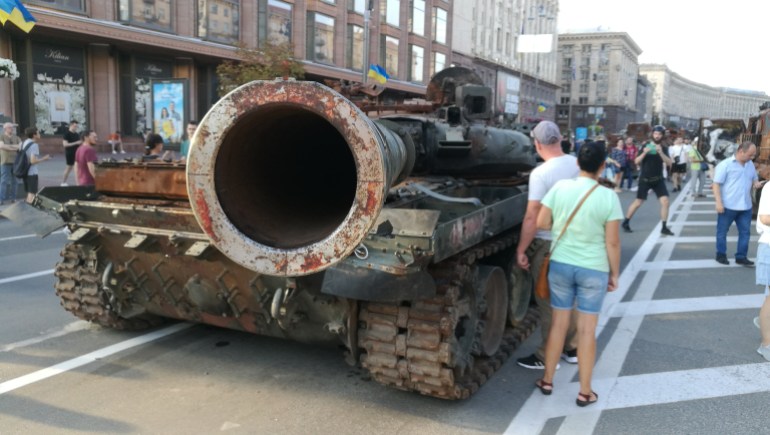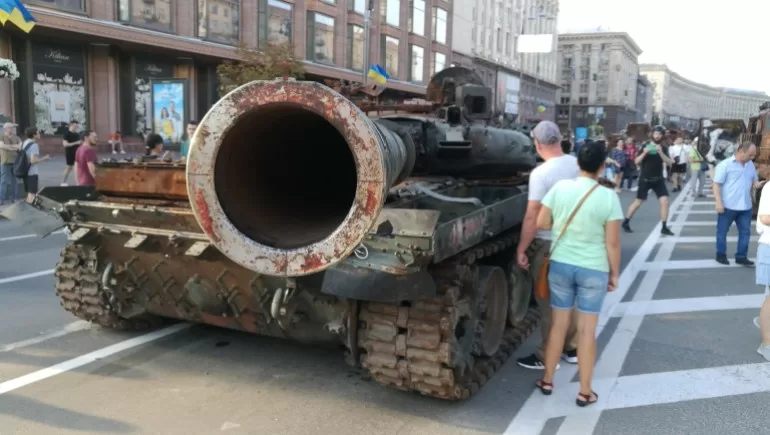Ukraine’s parliament dopted the law on Thursday after months of debates and almost 4,300 revisions.
Alina said her husband, who requested anonymity, and brothers-in-arms are dumbfounded by the scrapping of service limits. Earlier versions of the law had envisaged demobilisation after 36 months of service.
Without the limits – and with the failure of last year’s counteroffensive and months-long delays of Western military aid – they realise that their service may only end with their disability or death.
“The government humiliated and offended them,” Alina, who lives in Kyiv with two children, told Al Jazeera.
“They’re not eternal. They want to see their children grow, to be at home,” she said.
The demobilisation provision was scrapped at the request of Ukraine’s top brass who cited a severe shortage of servicemen on the front lines, especially in eastern Ukraine.
“The enemy outnumbers us seven to 10 times,” Joint Forces Commander Yurii Sodol told lawmakers on Wednesday, urging them to pass the law.
But President Volodymyr Zelenskyy has not announced a formal mobilisation fearing backlash and protests, and preferring to focus on the law.

The law was passed with 283 votes in favour in the 450-member parliament, mostly because Servant of the People, Zelenskyy’s party that dominates the Verkhovna Rada, backed it.
The law boosts pay for front-line service and death benefits for families, but Zelenskyy’s political rivals lambast the scrapping of service limits.
“There’s a lot that makes the law a whip without any stimuli,” wrote Volodymyr Aryev, a lawmaker with the European Solidarity, a party centred around former President Petro Poroshenko. “The government wrote it to treat defenders like a resource, not like heroes.”
Hours after the law was adopted, the parliament urged the government to develop an additional bill on demobilisation and rotation of servicemen on the front lines.
The scrapping of service limits predictably enraged seasoned soldiers – especially those who started their service in 2014, when Moscow backed pro-Russian separatists in southeastern Ukraine helping them carve out two separatist “People’s Republics”.
“Knowingly and voluntarily, I will become part of the most depraved category of citizens in my own country,” Artem Osipyan, a psychologist-turned-serviceman, wrote on Facebook.
“Who will I be next? Do I have to always remain a serviceman? Has my life been that insignificant? What makes other people’s lives more meaningful and less worthy of sacrifice than mine?” he asked rhetorically.
Younger servicemen also find the scrapping utterly confusing.
Shortly after Russia’s full-scale invasion of Ukraine began in 2022, Taras signed up for three years of military service.
“It was supposed to be like a job – three years in and then out,” the bespectacled 23-year-old with sparse stubble on his suntanned face told Al Jazeera.
Like all other servicemen on active duty, he has to withhold his name and details of his service.
“Looks like I’m serving until the victory” over Russia, Taras said with a tight smile.
To the families of servicemen, the uncertainty about demobilisation is depressing and demoralising.
“You don’t have to be at war until you die, you need to know when your service ends,” the wife of a soldier stationed in the eastern town of Kramatorsk told Al Jazeera.
He husband joined the military in 2015 but switched to volunteer work after wounds that affected his walking.
He went back to the service in 2022 and is still on the front line after suffering half a dozen contusions, developing problems with sight and digestion and spending weeks in hospitals.
“They will be there until last man standing. Literally, last man,” his wife said.
The uncertainty about the service limits also repels potential conscripts.
Within hours of the full-scale invasion that began in February 2022, volunteers thronged conscription offices, especially in eastern and central regions, and some even had to go to Ukraine’s west to enlist.
But the general enthusiasm sank after news of severe losses and horrible conditions in the trenches and military barracks amid the corruption of officers and suppliers.
The mobilisation law envisages the creation of an electronic registry instead of the obsolete paper-based system that bred corruption.
In the past two years, police and investigators have reported arrests of dozens of conscription officials.
Some amassed millions of dollars in cash and bought pricey real estate in Ukraine and in Europe.
Every man of fighting age will have 60 days to register in person or through the electronic registry, and those who do not will be considered draft dodgers.
Men will have to have their registration papers on them at all times.
Some servicemen say the mobilisation should go hand in hand with better training for conscripts.
“The enemy is strong, it has enough resources, enough people – if you can call them that,” a soldier stationed in the southern Kherson region told Al Jazeera.
“We need people who are better trained, who understand what they’ll be doing, what they’re signing up for,” he said.
Forced conscription has already become a scourge all over Ukraine.
In many rural areas, most men of fighting age have been drafted, while in urban centres potential soldiers avoid showing up in public places or using public transportation because of patrols of conscription officials and police officers.
Some men are urged to go to conscription offices to simply clarify their personal details – but never come out in their civilian clothes.
“Five guys I know went to a conscription office and didn’t come back” because they were dispatched to training bases right away, Tetiana Bozhko, who works at a hospital canteen in northern Kyiv, told Al Jazeera.
